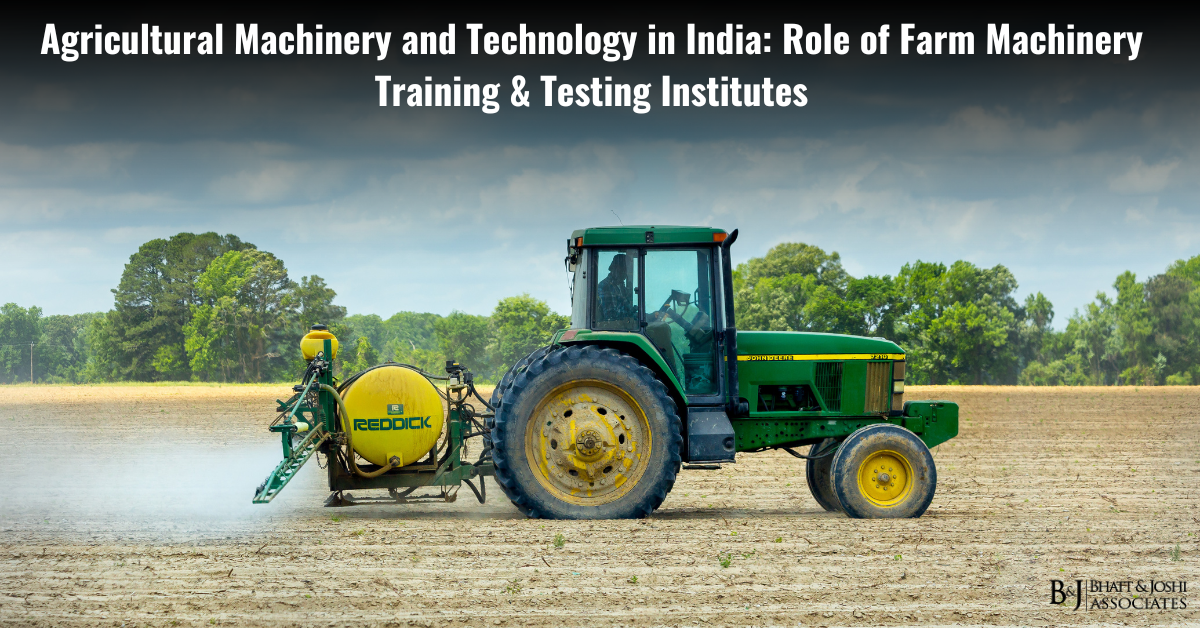Agricultural Machinery and Technology in India: Role of Farm Machinery Training & Testing Institutes (FMTTIs)
Introduction
The modernization of Indian agriculture heavily relies on the effective implementation and utilization of agricultural machinery and technology. At the forefront of this technological revolution are the Farm Machinery Training & Testing Institutes (FMTTIs), which serve as crucial centers for testing, training, and development of agricultural machinery. These institutes play a vital role in ensuring the quality, safety, and efficiency of agricultural equipment while building the technical capacity of farmers and other stakeholders in the agricultural sector.
The significance of FMTTIs extends beyond mere testing and training, as they contribute substantially to the broader objectives of increasing agricultural productivity, reducing post-harvest losses, and promoting sustainable farming practices across India. These institutes operate under the Ministry of Agriculture and Farmers’ Welfare, forming an integral part of the nation’s agricultural development strategy.
Historical Development of Farm Machinery Training & Testing Institutes (FMTTIs)
The journey of Farm Machinery Training & Testing Institutes in India began with the establishment of the first institute at Budni, Madhya Pradesh, in 1955. This initiative arose from the recognition that mechanization would play a crucial role in modernizing Indian agriculture. The success of the Budni institute led to the establishment of additional centers at Hissar (1963), Anantapur (1983), and Biswanath Chariali (1990).
The evolution of these institutes reflects the changing needs of Indian agriculture, from basic mechanization in the post-independence era to the current focus on precision farming and sustainable agricultural practices. Each institute has developed specialized expertise based on regional agricultural requirements and cropping patterns, contributing to the overall development of agricultural mechanization in India.
Institutional Framework of FMTTIs
The FMTTIs operate within a comprehensive institutional framework that ensures their effective functioning and coordination with other agricultural institutions. The institutes work in close collaboration with state agricultural universities, research institutions, and extension services to provide comprehensive support to the farming community.
Administrative Structure
The institutes function under the direct supervision of the Department of Agriculture and Cooperation, with each institute headed by a director who oversees various technical and administrative divisions. The organizational structure ensures efficient management of testing, training, and research activities while maintaining strong links with agricultural stakeholders.
Regional Specialization
Each FMTTI has developed expertise in specific areas based on regional agricultural patterns. For instance, the Budni institute specializes in testing and training related to tractors and power tillers, while the Hissar center focuses on combine harvesters and irrigation equipment. This specialization ensures comprehensive coverage of all aspects of agricultural mechanization across different agro-climatic zones.
Testing and Evaluation Systems of FMTTIs
The testing and evaluation of agricultural machinery constitute a core function of FMTTIs. These institutes conduct rigorous tests following established protocols and international standards to ensure the quality and performance of agricultural equipment.
Testing Procedures
The testing procedures encompass various aspects including performance evaluation, safety assessment, and durability testing. The institutes use state-of-the-art facilities and equipment to conduct these tests, ensuring accurate and reliable results. The testing protocols are regularly updated to incorporate new technological developments and international standards.
Certification Process
The certification process involves detailed documentation and verification of test results. Successful completion of testing leads to the issuance of test reports and certificates that are recognized nationally and internationally. These certifications play a crucial role in quality assurance and standardization of agricultural machinery.
Training Programs and Capacity Building at FMTTIs
Training programs form another vital component of FMTTI activities. These programs are designed to enhance the technical knowledge and skills of farmers, operators, manufacturers, and other stakeholders in the agricultural sector.
Farmer Training
The institutes conduct regular training programs for farmers, focusing on the proper operation, maintenance, and efficient use of agricultural machinery. These programs combine theoretical knowledge with practical hands-on experience, ensuring effective learning outcomes. Special attention is given to safety aspects and optimal utilization of equipment to maximize productivity and minimize operational costs.
Technical Training
Advanced technical training programs are offered for manufacturers, dealers, and service providers. These programs cover aspects such as design principles, manufacturing techniques, quality control, and maintenance procedures. The training helps in building a skilled workforce capable of supporting the agricultural mechanization sector.
Research and Development Initiatives of FMTTIs
FMTTIs actively participate in research and development activities aimed at improving agricultural machinery and developing new technologies suited to Indian conditions.
Technology Development
The institutes collaborate with research organizations and manufacturers to develop and modify agricultural equipment that meets specific regional requirements. This includes adaptation of imported technology to suit local conditions and development of indigenous solutions for agricultural mechanization.
Innovation Support
Support for innovation includes technical guidance, testing facilities, and feedback for machinery developers and manufacturers. The institutes also maintain demonstration units of various agricultural equipment, allowing stakeholders to assess their suitability for specific applications.
Quality Control and Standardization Practices at FMTTIs
Quality control and standardization of agricultural machinery are essential aspects of FMTTI operations. The institutes work towards establishing and maintaining standards that ensure the reliability and effectiveness of agricultural equipment.
Standard Development
The institutes contribute to the development of national standards for agricultural machinery in collaboration with the Bureau of Indian Standards. These standards consider both international norms and local requirements, ensuring their relevance and applicability.
Quality Monitoring
Regular monitoring of manufactured equipment ensures compliance with established standards. The institutes provide feedback to manufacturers and recommend improvements when necessary, contributing to the overall quality enhancement of agricultural machinery.
Technology Transfer and Extension Services of FMTTIs
FMTTIs play a crucial role in technology transfer and extension services, bridging the gap between research institutions and end-users of agricultural machinery.
Knowledge Dissemination
The institutes organize demonstrations, workshops, and field days to showcase new technologies and best practices in agricultural mechanization. These activities help in creating awareness and promoting the adoption of appropriate technologies among farmers.
Advisory Services
Technical advisory services are provided to various stakeholders including farmers, manufacturers, and government agencies. These services help in addressing specific challenges and promoting the effective utilization of agricultural machinery.
Environmental and Sustainability Aspects
Environmental considerations and sustainability form an important aspect of FMTTI activities, reflecting the growing awareness of ecological concerns in agriculture.
Energy Efficiency
The institutes promote energy-efficient agricultural machinery and practices, contributing to reduced fuel consumption and environmental impact. Testing procedures include evaluation of energy efficiency parameters, encouraging the development of eco-friendly equipment.
Sustainable Practices
Training programs incorporate modules on sustainable agricultural practices, including conservation agriculture and precision farming techniques. This helps in promoting environmentally responsible mechanization practices among farmers.
Future Perspectives of FMTTIs
The future of FMTTIs involves adaptation to emerging technologies and evolving agricultural needs. The institutes are preparing to address challenges related to precision agriculture, digital farming, and sustainable mechanization.
Technological Integration
Plans for integrating modern technologies such as IoT, AI, and automation in agricultural machinery testing and training programs are being developed. This will ensure that the institutes remain relevant in the era of smart farming and digital agriculture.
Capacity Enhancement
Continuous enhancement of testing facilities and training capabilities is planned to meet future challenges. This includes upgrading infrastructure, developing new testing protocols, and expanding training programs to cover emerging areas of agricultural mechanization.
Conclusion
Farm Machinery Training & Testing Institutes have played a pivotal role in advancing agricultural mechanization in India. Their comprehensive approach to testing, training, and technology development has contributed significantly to the modernization of Indian agriculture. The institutes continue to evolve, adapting to new challenges and technologies while maintaining their core mission of supporting agricultural development through mechanization.
The future success of these institutes will depend on their ability to embrace new technologies while continuing to address the basic needs of Indian agriculture. Their role in ensuring quality, safety, and efficiency in agricultural machinery remains crucial for achieving the broader goals of agricultural development and food security in India. As agriculture continues to modernize, the importance of FMTTIs in supporting and guiding this transformation will only increase.
 Whatsapp
Whatsapp



